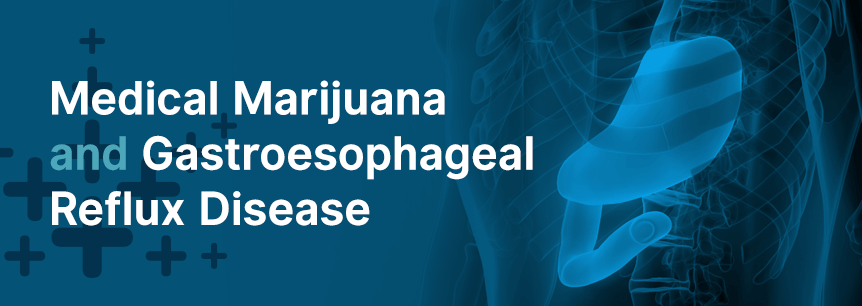
If you suffer from gastroesophageal reflux disease (GERD), you are not alone. According to the U.S. Department of Health and Human Services, GERD affects about 20 percent of the population. GERD is not a comfortable condition to live with, and it can significantly reduce an individual’s quality of life. If untreated, GERD can lead to serious complications down the line.
Fortunately, there are many ways to treat GERD and relieve symptoms. Sometimes, diet changes and exercise are enough to treat GERD. However, when a patient frequently experiences severe GERD symptoms, they may need something to relieve pain. Medical marijuana may effectively treat GERD-related pain, nausea, and inflammation in some patients. This article explores GERD and the use of medical marijuana for treatment.
Medical marijuana offers hope to individuals with GERD who do not want the side effects of conventional heartburn medication, but who also want fast relief. Marijuana is also known to reduce inflammation, which may help the body heal from the effects of GERD.
If you are interested in using medical marijuana for heartburn or GERD, keep reading. We will now look at reasons why cannabis may be an effective treatment for GERD.
Find A Doctor Find A Dispensary
A Temple University report, published in 2017, investigated the role of cannabinoids on esophageal function. Cannabinoids are chemical compounds found in the marijuana plant and the human endocannabinoid system (ECS). The human ECS regulates different functions throughout the body, including the gastrointestinal (GI) tract. The ECS also enables humans to experience the effects of cannabis.
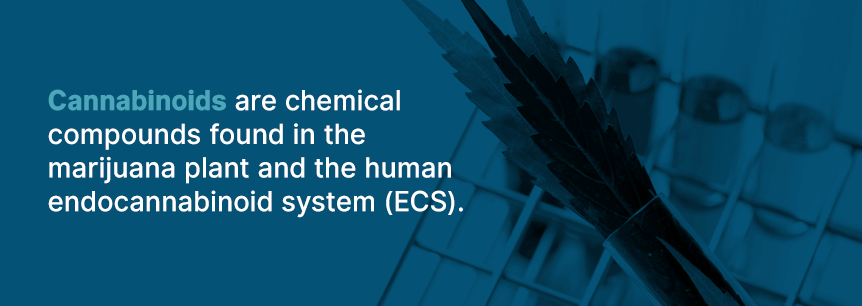
When an individual ingests cannabis, the cannabinoids from the plant attach to cannabinoid receptors in the ECS and activate them to produce different effects. For example, the ECS can initiate a feeling of hunger and pleasure. That is part of the reason some individuals who use cannabis experience an increased appetite. According to the report, the ECS fulfills the following roles within the upper GI tract:
The report looks at several studies and how cannabinoids affect the GI tract and acid reflux. One study included in the paper found a decreased rate of transient lower esophageal sphincter relaxations (TLESRs) in healthy volunteers who took tetrahydrocannabinol (THC). TLESRs are the leading cause of GERD in most patients. THC also reduced acid reflux episodes. This review suggests further study of marijuana for acid reflux and how cannabis can target the ECS in the GI tract to create healing, pain-relieving effects.
According to research published in the Asian Pacific Journal of Tropical Medicine, several preclinical studies support marijuana’s protective effect on the stomach. For example, researchers have found cannabinoids decrease stress-induced ulcers in rats. This article concludes cannabis inhibits stomach acid secretion. Also, the activation of certain cannabinoids protects the lining of the stomach, suggesting cannabis may be useful in treating peptic ulcers and GERD.
Medical marijuana can address factors that trigger or exacerbate GERD symptoms, such as stress and anxiety. When taken as recommended by a certified doctor, medical cannabis can make a patient feel less overwhelmed and worried. As a result, they may experience fewer stress-related ailments such as nausea and stomach pain.
Some studies show mental health impacts GI health. For example, studies of patients with gastric fistulas have shown anger increases stomach acidity. Likewise, certain stressful life factors and the onset of GERD are linked.
Although stress alone may not be enough to cause GERD, it can take a toll on the body and the digestive system. Medical marijuana can help patients relax and calm their minds. For instance, according to a recent study conducted by researchers from the University of Illinois at Chicago and the University of Chicago, individuals who took a low dose of THC experienced lower stress levels after taking a psychosocial test compared to those who took a placebo. However, study participants who took a higher dose of THC found the test “challenging” or “threatening,” which supports the idea that correct marijuana dosage is critical in achieving the desired effects.
Doctors often recommend medical marijuana to treat pain, and it’s a safer alternative than many conventional pain medications for individuals who struggle with acid reflux. Patients who suffer from GERD may experience pain in their chest, stomach or throat. Rather than turning to pain medication such as aspirin, which can make GERD worse, patients might use medical marijuana instead.
According to the Mayo Clinic, certain medications can increase the severity of GERD, leading to greater irritation and inflammation in the lining of the esophagus. The following pain medications can aggravate GERD:
Marijuana can decrease pain, so GERD patients do not need to take pain medicine that irritates their stomach and esophagus. A Harvard Medical School review of several cannabinoid studies confirmed high-quality evidence to support the use of medical marijuana to treat chronic pain.
GERD causes painful inflammation of the esophagus. According to researchers at the University of South Carolina School of Medicine, cannabinoids suppress an inflammatory response and weaken disease symptoms as a result. Considering marijuana’s anti-inflammatory properties, patients may want to explore their options regarding cannabis treatment and GERD.
Patients might use medical marijuana to treat the following GERD symptoms:
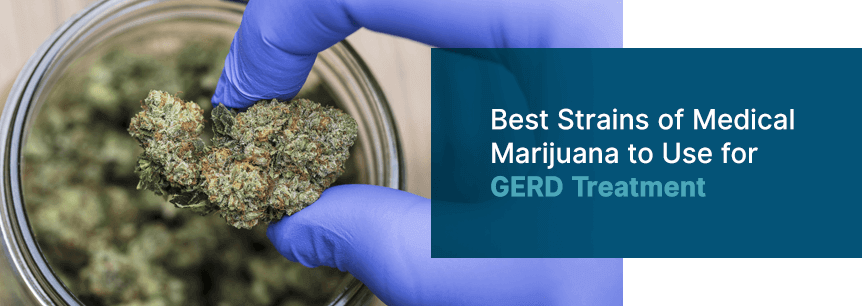
Many different types of medical marijuana for gastroesophageal reflux disease can treat a range of symptoms, whether you want to relieve pain, reduce inflammation or alleviate nausea. Both THC and cannabidiol (CBD) in the cannabis plant have anti-inflammatory and pain-relieving qualities. The difference is, THC can make patients feel “high,” whereas CBD does not produce psychoactive effects.
The strain you choose depends on the experience you wish to have. Marijuana affects everyone differently, so it’s important to speak with a certified marijuana doctor to determine the best strain for you and your condition. Here are some suggestions.
When choosing a strain, consider how it might affect your GERD overall. For example, certain marijuana strains may stimulate your appetite. Keep in mind that GERD patients want to avoid overeating or eating before bed. Discuss these factors with your doctor or ask a dispensary for assistance.
There are several different ways to take marijuana medicine. GERD patients, in particular, should consider the following treatment methods.
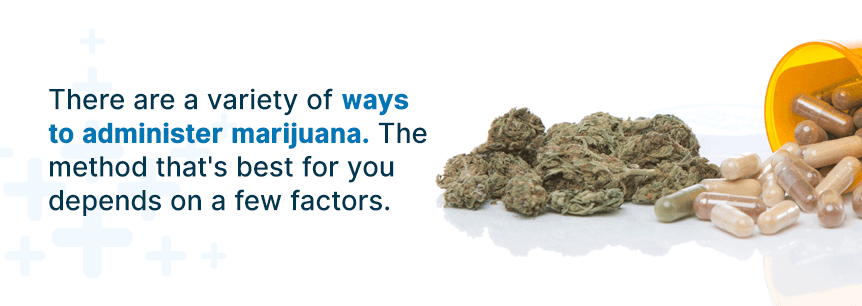
Medical marijuana patients may also consume their medicine in the form of cannabis-infused food, such as cookies, brownies or candy. However, considering that sugary, fatty foods can aggravate GERD, patients may want to leave edibles out of their treatment plan.
Like most medications, marijuana may cause side effects. Speaking with a certified cannabis doctor can help you determine the appropriate THC or CBD levels for you and your condition, as well as the best method of administration. That way, you’ll reduce the risk of experiencing unpleasant side effects.
Some patients do not have any side effects, while others may experience one or more depending on the dose, their experience, and the cannabis strain. Marijuana can cause the following side effects:
GERD is challenging to live with. Medical marijuana may provide relief and reduce inflammation resulting from GERD, so you do not have to rely on antacids or prescription drugs to get you through the pain.
Speaking with a certified medical marijuana doctor can help you determine if marijuana is the best treatment for your acid reflux or GERD. At MarijuanaDoctors.com, we strive to make it easy to connect with qualified cannabis doctors and dispensaries. If you have questions about medical marijuana or want to start treatment, find a certified doctor or dispensary today.
Find A Doctor Find A Dispensary
GERD is the result of an irritated esophagus. Your esophagus is a tube that carries food to your stomach. When the muscle at the end of your esophagus does not properly close, acid from your stomach can rise into your esophagus and cause irritation and inflammation. When this happens, you may feel burning in your chest, mouth or throat, also known as heartburn. However, GERD does not always present itself in the form of heartburn. Sometimes GERD does not cause a burning feeling, but instead, may make it difficult to swallow.
It is common to experience gastroesophageal reflux or heartburn once in a while. However, if you have heartburn more than twice a week for a few weeks, it could mean you have GERD. In other words, GERD is a more long-lasting, severe form of gastroesophageal reflux. Untreated GERD can cause health problems over time.
Most patients who suffer from GERD experience a burning sensation in their chest as a result of stomach acid.
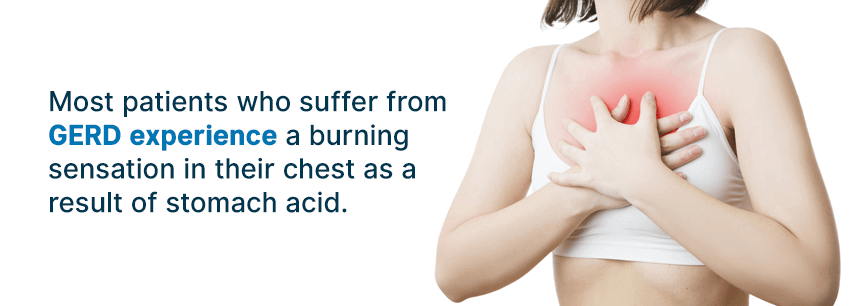
However, other symptoms may include:
Heartburn and GERD happen when the lower esophageal sphincter becomes weak or relaxes, allowing food or stomach acid to rise into the esophagus. Several different factors may cause the esophageal muscle to relax or weaken, such as:
Factors that might trigger GERD symptoms include:
Before your doctor recommends prescription medication or surgery, it’s like they will first suggest modifying your lifestyle to treat GERD. They may ask you to do one or more of the following:
If lifestyle changes do not provide symptom relief within a few weeks, your doctor may prescribe medications such as prescription-strength Pepcid or Zantac. If your GERD is severe or if you do not wish to take medicine, your doctor may recommend surgery to reduce the amount of acid that enters your esophagus.
GERD medications may produce undesirable side effects many patients would rather avoid.

For example, antacids may cause:
It is also worth noting that antacids do not heal the stomach or esophagus. They merely provide temporary symptom relief. Over-the-counter and prescription GERD medications may cause the following side effects:
Proton pump inhibitors (PPIs), such as Prilosec and Prevacid, decrease the amount of acid your stomach produces. Studies show people who take PPIs for extended amounts of time or in high doses are at increased risk of fracturing their hip, wrist or spine. Also, people need to take PPIs on an empty stomach for them to work, which may not be convenient for many patients.
If people who have GERD do not seek treatment, a constantly irritated esophagus can lead to serious issues, such as the following.


Please allow us to access your location to find local dispensaries.
VIEW ALL DISPENSARIES ➔